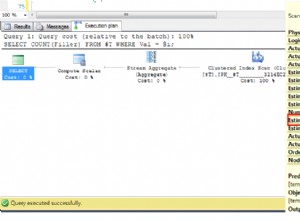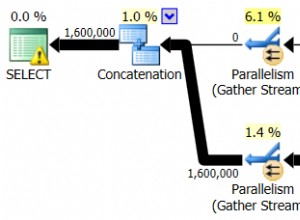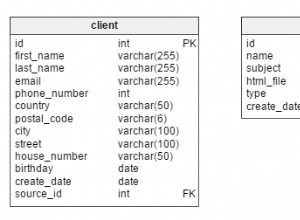Musisz najpierw policzyć liczbę wierszy w bieżącym zapytaniu:
$numrows = $s->rowCount();
i musisz umieścić vaiable dla wyników na stronę, powiedz $resultsPerPage:
$resultsPerPage=10;
Następnie strona, na której aktualnie się znajdujesz:
$offset=$_REQUEST['offset'];
Następnie musisz uruchomić poniższy kod:
$limit=$resultsPerPage;
$PHP_SELF=$_SERVER['PHP_SELF'];
if($numrows >= 1) {
// determine if offset has been passed to script, or if offset has been tampered with.
if (empty($offset) || ($offset < 0) || ($offset > $numrows)) {
$offset=0;
}
// Determine if a "PREV" link is necessary - if so, add it to the links array
if (($offset > 0) && ($offset <= $numrows)) {
$prevoffset = $offset - $limit;
$link_array[] = "<a href=\"$PHP_SELF?offset=$prevoffset" . $addOn . "\">Prev</a> \n";
}
// Determine the total number of pages needing links
$pages=intval($numrows/$limit);
// $pages variable now contains integer number of pages needed, unless there is a remainder from division
if ($numrows % $limit) {
// There is a remainder, so add one page
$pages++;
}
/*
for ($i=1; $i<=$pages; $i++) { // loop thru
$newoffset=$limit*($i-1);
if ((intval($offset/$limit)) == (intval($i-1)))
{ $link_array[] = "[$i] \n"; }
else {
$link_array[] = "<a href=\"$PHP_SELF?offset=$newoffset" . $addOn . "\">$i</a> \n";
}
}
*/
$start_page=intval($offset/$limit)-4;
$end_page=intval($offset/$limit)+5;
if($start_page<=0){
$start_page=1;
}
if($start_page<2){
$end_page=10;
}
if($end_page>$pages){
$end_page=$pages;
}
for ($i=$start_page; $i<=$end_page; $i++) { // loop thru
$newoffset=$limit*($i-1);
if ((intval($offset/$limit)) == (intval($i-1)))
{ $link_array[] = "[$i] \n"; }
else {
$link_array[] = "<a href=\"$PHP_SELF?offset=$newoffset" . $addOn . "\">$i</a> \n";
}
}
// Determine if this is the last page.
if (!(($offset/$limit)==$pages) && $pages!=1) {
$newoffset=$offset+$limit;
// if not last page give NEXT link
if((($numrows - $offset) > $limit) && ($pages !=1) && ($offset < $numrows)){
$link_array[] = "<a href=\"$PHP_SELF?offset=$newoffset" . $addOn . "\">Next</a><br>\n";
}
}
}else{
; // redirect to error page
}
if ($resultsPerPage > 0 && count($link_array) > 1)
{ echo "Page: ";
array_walk($link_array, 'printArray');
}




